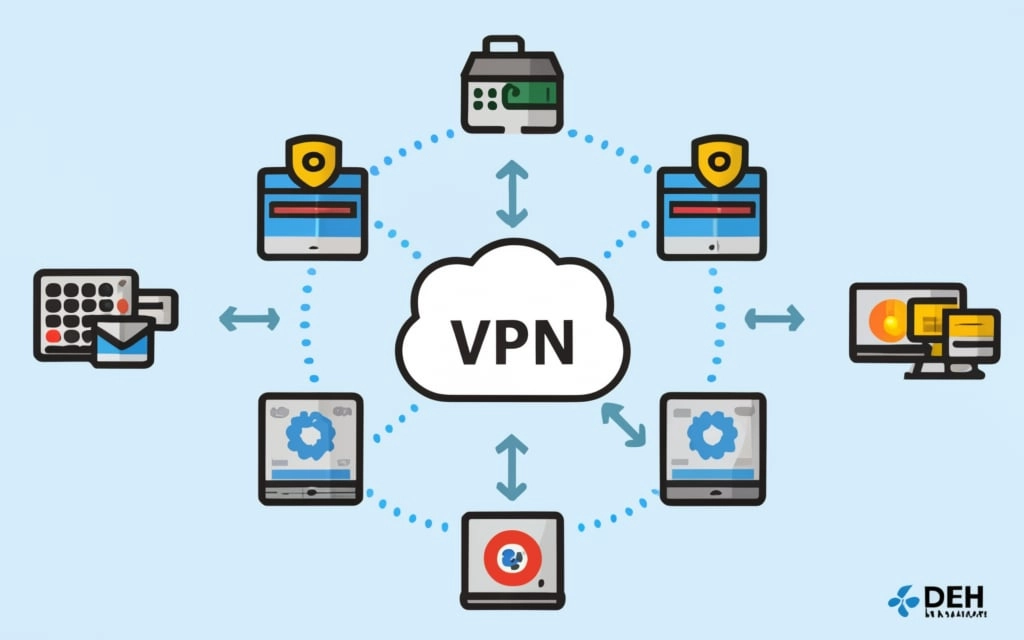Setting up a VPN for a local cluster: step-by-step guide

In the modern world, where data security plays a key role, setting up virtual private networks becomes a necessary task for IT specialists. In this guide, we will take a detailed look at the process of creating a VPN gateway for a local cluster.
Important information about setting up a VPN for a local cluster
Let's start by explaining that a local cluster — is a group of servers or computing devices located in the same physical location that work together to perform common tasks and applications. Such clusters are often used in corporate and scientific centers to improve performance, provide fault tolerance and manage large volumes of data.
For example, Company A has a main office and several branches around the world. Using Site-to-Site VPN the company connects all its branches into a single secure network, which allows employees to securely exchange data and collaborate on projects as if they were in the same office.
VPN for a local cluster provides a secure and encrypted connection between different parts of the network, which is especially important for the transfer of confidential data. Below are a few reasons why setting up a VPN for a local cluster is important:
- Data security: VPN protects data from interception and provides encryption, which prevents unauthorized access.
- Remote access: allows employees to securely connect to internal company resources from anywhere in the world.
- Reducing the risk of leaks: VPN helps prevent data leaks, which is especially important for companies working with sensitive information.
- Centralized management: makes it easier to control access to resources and manage the network.
Basic steps for setting up a VPN for a cluster
Step-by-step instructions will help you easily set up and manage a VPN connection between two clusters:
- Step 1: create a VPN gateway for the local cluster. At the first stage, we will create a VPN gateway for the local cluster (OnPremCluster). At this stage we will not create a VPN connection. For successful operation, VPN gateways of both clusters must know IP-addresses and CIDR of each other. In our example, we will use the cloud control plane to assign new IP addresses to VPN gateways. This will avoid a situation where the inability to create one component prevents the creation of another. To find the CIDR, you need to go to a virtual private network (VPC) created using the LSF automation package. In our case, the us-south-3 region is used with the corresponding IP address range 10.240.128.0/18.
- Step 2: setting up a VPN in the VPC infrastructure. Now you need to go to the VPC Infrastructure section and select VPNs. On the page "VPNs for VPC" Make sure the Dallas region is selected, then click the Create button. Use the following settings: VPN type - “site-to-site” gateway; resource group - hpca_resgrp; virtual private network - VPC used by OnPremCluster; subnet - will be selected automatically, since only one subnet is created in VPC OnPremCluster; regime - based on policy; VPN connection for VPC - not selected.
- Step 3: creating a VPN gateway. After clicking the “Create VPN Gateway” button, it will take some time for the gateway IP address to be allocated and displayed on the VPN page. This IP address will be needed to create the next cluster.
Configuring a VPN for a local cluster includes several steps, starting with creating a VPN gateway and ending with configuring parameters in the VPC infrastructure. By following this guide, you will be able to successfully configure and manage a VPN connection, ensuring the secure and stable operation of your clusters.
Configuring VPN for a local cluster — This is a complex but necessary process to ensure the security and stable operation of a corporate network. When configured correctly, a VPN significantly increases data security, improves network management and ensures a reliable connection between different company locations.
Private VPN server: catalyst for network optimization
Using a private VPN server can significantly improve and optimize the VPN setup for a local cluster, providing a higher level of security, manageability and performance. It allows you to control all aspects of your network, ensuring reliable and efficient connections for all users and devices in your organization.
You can study more detailed information and buy a private VPN server on Private VPN server. On this portal, the FAQ section provides answers to frequently asked questions about private VPN servers. In articles about VPN, users will find a lot of information about products in this category in the modern Russian digital market.